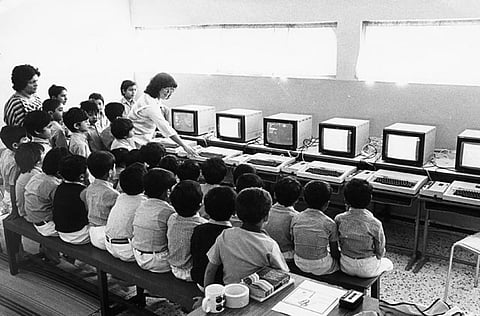Education key to development
From the humble centres in the '30s and '40s, basic education in the Emirates has come a long way

Abu Dhabi: From several humble centres for education in the '30s and '40s, to the hundreds of schools currently in operation, basic education in the Emirates has come a long way.
"There are now approximately 268 public and 183 private schools across the emirate... compared to only five before the unification of the UAE in 1971," Mohammad Salem Al Daheri, Executive Director of School Operations at the Abu Dhabi Education Council (Adec), said.
"Within that year, however, the number of schools rose to 25, which is a 500 per cent increase. They housed 7,987 pupils who were taught by 439 teachers," he added.
According to Al Daheri, the curriculum that was initially used focused on developing pupils' skills in reading, writing and mathematics, mainly through the Arabic curriculum in addition to the study and interpretation of the Quran.
"As more schools were established, pupils were exposed to many new subjects, including English, science, culture... even physical education was encouraged at a school in Al Ain founded by the late President, Shaikh Zayed Bin Sultan Al Nahyan," the executive director said.
He noted that many schools followed the curriculum from Jordan as well as its school system due to the number of teachers and administrators recruited from that country.
Extensive visits
"It was the curricula of choice as a result of extensive visits and recruitments by the founders of several schools since the 1930s... but in the '60s, the government in the emirate instructed that the curriculum be adapted and developed to meet the needs of Emirati pupils," Al Daheri said.
That new curricula became the foundation of the system that is currently in place, which exposes pupils to a wide range of subjects and utilises the latest techniques in order to enhance pupil experience and prepare them for the challenges that await them after leaving school. "As a result of the government of Abu Dhabi's continuous efforts in that regard, illiteracy has dropped sharply from 23.4 per cent in 1995 to 8.3 per cent in 2009," Al Daheri said.
But before the lower educational sector reached its current level, it faced many challenges as the government strove to build the fledgling school division. These included a high number of pupils disregarding their education and the limitations that arose as a result of traditional and rote learning.
"One concern that was highlighted was that ‘quantity' rather than ‘quality' education was taking place all those decades ago, due to a pressing need to increase the number of educated Emiratis who, it was expected, could then take over various positions within our society," Al Daheri said.
He noted that it became apparent that the system was hindering pupils' potential and since then steps have been taken that have largely addressed those issues. However, as with every educational sector around the world, some challenges still remain.
Smooth transition
"While many of those issues have already been addressed successfully, one of the challenges that remains is that of the pupils currently graduating from public high schools, only three per cent are able to smoothly transition into university without the need to take remedial courses for subjects including mathematics, language and computer," Al Daheri said.
The executive director also highlighted that since Adec's establishment in 2005 and its Memorandum of Understanding (MoU) with the Ministry of Education a few years later, the council had successfully launched several initiatives to help develop the public school sector.
"Adec has been tasked with two main goals: the development of the educational sector, including its institutions; and providing advice on the development of policies and educational services in the emirate," Al Daheri said.
"To achieve them, one of the methods we have implemented was partnering with many schools and education-based companies to benefit from their feedback and expertise. The council is also continually enhancing this sector through constant vigilance in all areas, including the hiring of qualified teachers that will help us achieve our targets," he added.
Interactive learning
This process has already begun, as Adec announced during the Bedaya Forum in September this year, several pilot projects are launching throughout this academic year, including the iClass, which provides pupils with a more interactive learning experience.
"Due to the skills demanded in the 21st century, we are studying how to continue adapting the current teaching environment into one that is more knowledge-based, which encourages a love of learning in pupils through fostering interactivity and creativity," Al Daheri said.
"It is through such initiatives that we will continue to develop our educational sector so that it not only meets the current needs of the global environment but also allows us to become among the leading educational sectors in the world," he added.
Sign up for the Daily Briefing
Get the latest news and updates straight to your inbox


